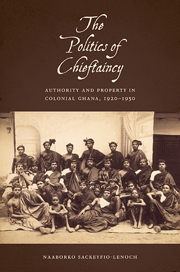Book contents
- Frontmatter
- Dedication
- Contents
- List of Illustrations
- Acknowledgments
- Abbreviations
- Introduction: Contesting Space and Authority in a Colonial Capital
- 1 Situating Ga Institutions in the European Colonial Milieu
- 2 Land Legislation, Commodification, and Effects in Accra
- 3 Negotiating Chieftaincy, the Ga Stool, and Colonial Intervention
- 4 Succession Disputes, the Ga State Council, and the Future of Chieftaincy
- 5 Contesting Property in Accra and Its Periurban Locales
- Conclusion
- Notes
- Bibliography
- Index
2 - Land Legislation, Commodification, and Effects in Accra
Published online by Cambridge University Press: 05 October 2014
- Frontmatter
- Dedication
- Contents
- List of Illustrations
- Acknowledgments
- Abbreviations
- Introduction: Contesting Space and Authority in a Colonial Capital
- 1 Situating Ga Institutions in the European Colonial Milieu
- 2 Land Legislation, Commodification, and Effects in Accra
- 3 Negotiating Chieftaincy, the Ga Stool, and Colonial Intervention
- 4 Succession Disputes, the Ga State Council, and the Future of Chieftaincy
- 5 Contesting Property in Accra and Its Periurban Locales
- Conclusion
- Notes
- Bibliography
- Index
Summary
From its outset European contact with the Gold Coast and its interior areas was commercial and stimulated the commodification of land. European traders paid rent to local authorities for the sites of their trading stations, and the exploitation of minerals, in particular the gold rush of the late nineteenth century, made it clear that land had acquired exchange value. Moreover, the introduction of cash crops such as cocoa meant that farmers and other individuals wanted assurances of returns over longer periods, providing an impetus for landownership and alienation. Shortages of land stimulated the “macro-movements of farmers” into central Akan and other eastern areas. More specific European influences, such as English legal ideas, the concepts of freehold and mortgage, and a monetary system, created a new landscape for the articulation of ownership, rights, alienation, and acquisition. The rapid changes in the meaning and practices associated with land matters correlated with the growing importance of urban land in Accra and the intensity with which people fought over it.
British colonial officials introduced a series of land ordinances and laws during the late nineteenth and early twentieth centuries, changing the meanings of property in the Gold Coast. The language articulated in the various legislative instruments concerning property in the Gold Coast, starting with the 1876 Public Lands Ordinance, introduced new interpretations and conceptualizations of property.
- Type
- Chapter
- Information
- The Politics of ChieftaincyAuthority and Property in Colonial Ghana, 1920-1950, pp. 40 - 71Publisher: Boydell & BrewerPrint publication year: 2014

